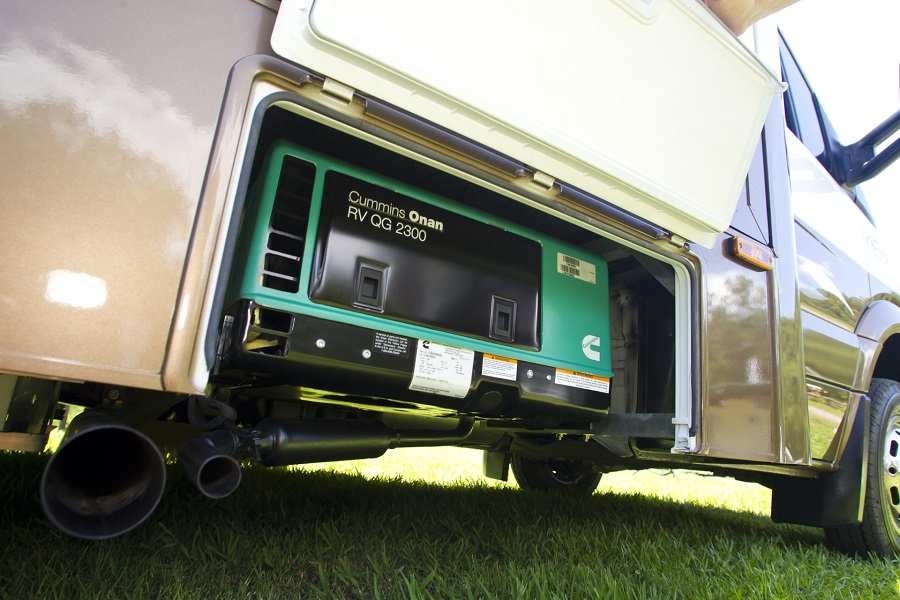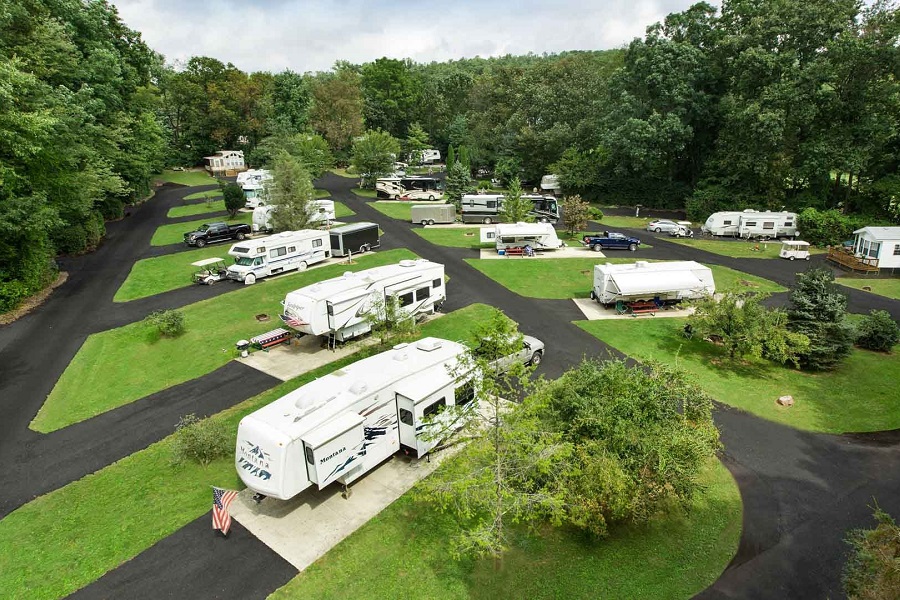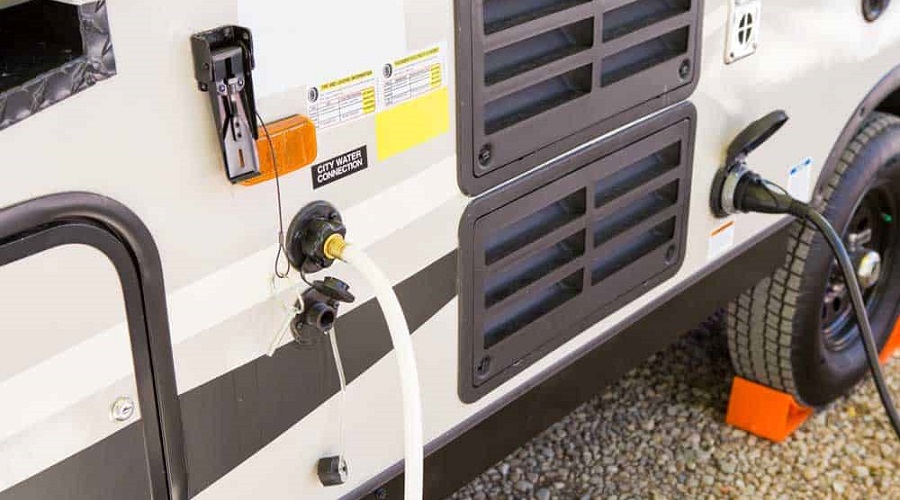Not all families love camping, but a fifth wheel or travel trailer promises the excitement of a natural outdoor vacation for those that do.
Also, having a large or small trailer avoids the issue of late-night accommodations when exploring the country.
If you’re in a tight spot and haven’t made any campsite bookings, the worst-case scenario is you can pull the trailer with your vehicle down a side road and get some sleep. This is a parking situation that you want to avoid, but no one can dispute the convenience and fun of traveling with a travel trailer.
Learn about the fifth wheel vs. travel trailer and everything you need to know to choose between the two for your next adventure.
What is a fifth wheel?

History explains part of the reason that this massive trailer is known as the fifth wheel.
In olden times, carriages were drawn by horses. The manufacturers inserted the fifth wheel horizontally under the carriage over the front axle to allow the carriages to be more maneuverable.
Technological advances mean that the modern fifth wheel looks nothing like its historical origins, and its workings have also improved drastically.
The fifth wheel now uses a hitch with a fitting in the shape of a ‘U,’ which lies under the vehicle and which you connect to the fifth wheel travel trailer, using its king pin attachment. This attachment design ensures that the trailer connects securely to the truck’s undercarriage and supports stability and maneuverability.
Fifth wheel travel trailers are large and heavy, which is why you need to tow them with a one-ton vehicle. Due to the size of the trailer, you must couple the car to the trailer with its unique hitching system, which must also be on the truck bed for stability and strength. The fifth-wheel trailer is also extended and can be anything from 25 to 45 feet in length.
Many travel enthusiasts choose the fifth wheel over A and C class motor-homes due to their versatility. You can unhitch the vehicle at any time after parking the trailer to separate the vehicle and living quarters. Separating the truck and trailer allows you to explore the surroundings without the hassle of towing the trailer, which adds to the convenience of this type of vacation experience.
The fifth wheel is also trendy because it comes with many slide-outs, making storage a cinch when traveling. Multiple slide-outs also improve the number of conveniences you get to enjoy when you purchase the fifth-wheel travel trailer.
Besides having ample room to sleep, slide-outs ensure more space for luxurious amenities. You get to enjoy a vacation away from home without sacrificing creature comforts as the trailer supports almost all the luxuries of home. Only the fifth wheel enhances the travel experience because you get to enjoy loads of recreation time without worrying about your next stopover.
What is a travel trailer?

As some people call them, travel trailers, or bumper-pulls, are trailers that provide similar facilities as an RV. Travel trailers are available in various shapes and sizes that offer the same home experience while on the road.
Like the fifth wheel, you also need a vehicle to hitch and tow the travel trailer. However, you can use a car to tow the travel trailer instead of needing a powerful one-ton truck to do the job. Also, like the fifth wheel, the travel trailer has a safe, secure hitch and towing mechanism to stabilize the driving experience.
You can customize the travel trailer as a permanent or semi-permanent home on the road. Anyone looking at purchasing one of these trailers for camping can design their own floor plans.
Travel trailers range between 13 and 40 ft. and can sleep up to 10 and even 15 people in the largest trailers, making this an ideal choice for camping fans. Trailer walls are sturdy to support privacy when you have many rooms in the trailer.
The travel trailer is easy to erect and serves as a practical ‘lock up and go’ home with security door locks. These trailers typically have a decent selection of slide-outs for optimum storage. Multiple slide-outs also add to the convenience of home living amenities to enhance the outdoor living adventure.
Travel trailers are easy to set up, convenient when you arrive late at a campsite. Depending on the size of the trailer and your home property, these travel trailers are also much easier to store than large motor-homes as they take up less space.
If you don’t find Class A, B, or C motor-homes appealing or you don’t want to go to the expense of getting a fifth wheel, the travel trailer offers an excellent camping option.
Deciding about which trailer or motor-home to purchase can be confusing. If you have already written off motorhomes and are looking at trailers, a comparison between the fifth wheel vs. travel trailer should help guide your purchase.
Comparison
It is normal to speculate about the similarities and differences between the fifth wheel vs. travel trailer. They both look similar except for the size differences, although some trailers can also be quite huge.
You may wonder whether the fifth wheel vs. travel trailer compares in terms of the amenities they offer, even if the trailer’s luxuries are available on a smaller scale.
Camping fans may also question whether it worth purchasing a fifth wheel or a travel trailer when they weigh the benefits against the disadvantages.
Let’s compare these two trailer types to understand better what they offer.
Similarities
The fifth wheel vs. travel trailer can appear quite similar except for their size and length. However, these trailer types share an equal number of similarities and differences.
The similarities between these two trailers primarily cover the unhitching and setting up aspects, storage, and sleeping space of the two trailer types. Beyond these likenesses, the differences are vast in terms of the overall space and luxury between the two trailer types.
1. Unhitch and set up
When discussing the fifth wheel vs. travel trailer, both are reasonably easy to unhitch and set up. Once you unhitch these trailers, you have your vehicle to use whenever you need to drive somewhere. Besides exploring the region for its recreational value, you need a vehicle to obtain supplies from the local supplier.
Few people plan well enough to store food and other items far in advance. Even the people who plan well will appreciate using their vehicle without the hassle of towing a trailer when on vacation. This park and unhitch aspect are handy if you want to explore rough mountain terrain in your 4×4 or SUV, which is virtually impossible when towing a heavy trailer.
2. Sleeping space
The fifth wheel and smaller travel trailers offer ample sleeping rooms, depending on the size of the travel trailer you purchase. A fifth wheel can sleep up to 12 or 15 people, while the travel trailer has enough space to sleep from four to 15 people. How many people each trailer sleeps depends on the floor plan you select.
3. Home storage
Unless you plan to make your fifth wheel or travel trailer your permanent abode, it will be problematic to store either of these trailers on home properties. These trailers are too long to keep on residential properties, so you may want to find a permanent storage solution for your trailer if you only use it for intermittent vacation purposes.
Differences
The significant differences between the fifth wheel vs. travel trailer relate to the size and height of the fifth wheel. Most fifth wheels have an upstairs bedroom and a living area.
While travel trailers can also be long, the fifth wheel is exceptionally long and much heavier, requiring a one-ton vehicle to pull the fifth wheel. In contrast, the travel trailer typically only requires a mid-size SUV to tow the trailer. But there are many other differences between these two trailers as well.
1. Luxurious amenities
Where travel trailers come with certain luxuries, few have the comparative luxury of the fifth wheel. Comparisons between the fifth wheel vs. travel trailer show that the fifth wheel can come with a fireplace, two master bedrooms, a dishwasher, and a washer and dryer. Few travel trailers can compare in terms of the luxuries you find in the fifth wheel.
2. Ease of driving
Driving between the fifth wheel vs. travel trailer is vastly different. Due to the positioning of the hitch and the design of the towing attachment, fifth wheels are easier to drive. The fifth wheel is often seen as safer to tow than the travel trailer because of the hitch’s placement.
Hitch placement on the fifth wheel is higher and more centralized on the truck bed, which improves stability, making it easier to tow the trailer in windy conditions. Also, the hitch placement ensures easier turning of the fifth wheel because the turning radius is wider.
In contrast, the hitch system of the travel trailer is at a lower point, which means it sways more on the road, especially when driving in windy conditions. Similarly, the hitch location on the travel trailer means that turning the trailer is more complicated.
You can purchase equipment to improve the driving experience if you have a travel trailer. But smaller travel trailers will have a better driving experience than large fifth wheelers.
3. Campsite bookings and general travel stops
Campsites cater to most fifth wheels and travel trailers. It is only when these trailers are longer than 24 ft. that you may find it challenging to find a camping spot at your favorite vacation destination. Always check this aspect when traveling.
Another issue to consider with the fifth wheel vs. travel trailer question includes fuel stops, parking for grocery purchases, and generally traveling in built-up areas. The trailer truck extends the overall length of the travel trailer as it does with the fifth wheel. Parking and traveling in built-up areas remain a consideration no matter which trailer you opt to purchase.
4. Cost
Fifth wheel vs. travel trailer pricing differences are as diverse as the luxuries available in these trailer types. Fifth wheel average prices range from $20,000 for the most basic trailer to $50,000 for the more luxurious version.
Additionally, an expensive one-ton truck is needed to tow the fifth wheel, adding to the cost of the fifth wheel. In contrast, you can get away with a cheaper vehicle to tow the travel trailer, which averages a price range between $11,000 and $35,000, partly why they are more popular.
Which one should I choose?

Deciding between the fifth wheel vs. travel trailer purchases is not difficult when you know what you want. Even if you have an unlimited budget, you may still decide to purchase a travel trailer instead of the fifth wheel.
The average travel trailer is much smaller and somewhat easier to manage around urban areas than the fifth wheel, although it is more difficult to tow.
It is also easier to find campsite spots for smaller travel trailers than for the more enormous fifth-wheelers. Despite their drawbacks, the travel trailer offers similar basic amenities as the fifth wheel, even if these are far less luxurious.
On the other hand, the fifth wheel offers all the luxury of home while exploring mountainous campsite spots or parking at ocean resorts. The fifth wheel is also easier to manage on the road but comes at a much higher cost than the travel trailer.
If the fifth wheel vs. travel trailer purchase decision depends on cost, then the travel trailer is the winner. If luxury is your goal, then the fifth wheel is the better choice.
Conclusion
Traveling is fun, and exploring is exciting. Whether you choose to do either in a fifth wheel or a travel trailer is up to you.
Overall, the choices between the fifth wheel vs. travel trailer come down to length, luxury, cost, and space. If you can afford the fifth wheel and aren’t averse to handling such a large trailer, then this one is for you.
If you prefer a more straightforward vacation option, then the travel trailer is easier to manage.
Resources:



